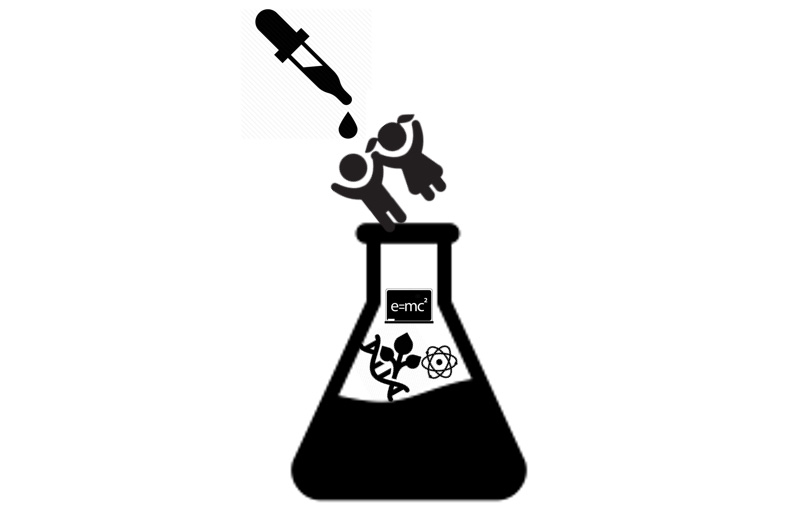
Science Education of young generations, STEM, STEAM, Citizen Science and other activities are increasingly considered relevant globally, which is where the GYA should come in as a voice of young scientists, and contribute to these efforts by leading activities and providing role models. To be a role model in science outreach and science education, the aim of this working group is not only to engage young people in science through various activities, science cafes and science festivals, but also to create an online platform to coordinate such efforts by uploading/downloading activity materials, share documents and experiences, get feedback and even compile data towards “measuring excellence in science engagement activities”.
In July 2020, the GYA working group on the Expedition Mundus science game was integrated into this group, and the Mundus science game activities by GYA members now continue from within this group.
The group also aims to enlarge its fields of activity by generating additional funds through various fundraising initiatives, including the European Union’s Horizon 2020 funding stream.
Watch the group’s videos for the 2020 GYA e-Annual General Meeting here and here
Website and teaching materials on Trust in Science
Former GYA Advisory Board member Bruce Alberts and colleagues are behind a website on “Why trust Science?”. The website is intended to serve as a repository for material to help the teaching of trust in science and acquaint students with understanding of the scientific method and of how the science community creates reliable knowledge. The authors contend that in an age of constant mis-information, science education must change and must include the explicit teaching of knowledge production, beginning in middle school and extending through college.
To encourage such teaching, the website contains a brief essay on Why Trust Science?, as well as links to free, high-quality teaching tools and other resources for teachers or science education and outreach practitioners.
*******************
For a list of group co-leads since the group was established in 2012, see here.
N/A
Watch a brief welcome message from the SEY group here.
—————————————————————————————————————————————————————
See details about the Expedition Mundus science game here.
—————————————————————————————————————————————————————
The members of this GYA working group routinely carry out various science education activites in their home countries. They are currently working on the following activities:
Projects 2024/25
In March 2025, and led by group co-lead Reem Abou Assi and group member Chan Siok Yee, the group produced a “Green Ambassadors Colouring Book“. GYA members from multidisciplinary and international institutions collaborated with students from the Technology Incubator for Entrepreneurship at Al-Kitab University (Iraq). Together, they developed and published a multilingual colouring book (in English, Arabic, Kurdish, and Turkish) designed to raise awareness about climate change among children aged 6 to 12 (DOI:10.26164/GYA_01267).
Several copies were printed, for distribution at the GYA Annual General Meeting in Hyderabad, India in June 2025, and at an event hosted by Universiti Sains Malaysia, led by the School of Pharmaceutical Sciences (Thoughts Formulation Lab) and the Green Ambassador Teams (Malaysia), as well as at Al-Kitab University, spearheaded by the College of Pharmacy (EDEN Research Group) in partnership with the Technology Incubator for Entrepreneurship (Iraq).
Beyond promoting environmentally friendly practices, this project also aims to foster cross-cultural understanding by introducing young readers to different languages and cultures. Readers also can dive into the stories of the GYA members featured in the colouring book.
You can download the booklet here.
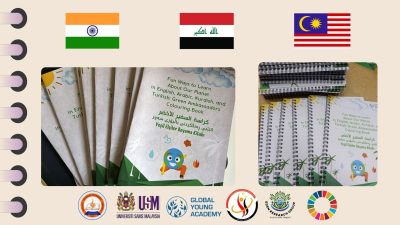
In February 2025, on the occasion of International Women and Girls in Science Day, group members together with members from the Women in Science group compiled a video of inspirational messages.
During 2023/2024, group member Elina Amadhila worked on a project on “Reducing unemployment & achieving Vision 2030: Voices from Namibian Youth”. She looked at high youth unemployment in Namibia, also among graduates in the country, which hinders growth and development.
Based on interviews of unemployed graduates, she was able to highlight reasons for high unemployment but also asked for ideas how unemployment rates might be reduced. A project report on “Reducing Unemployment: Voices from unemployed youth graduates in Namibia” can be accessed here.
In November 2024, the group together with the Women in Science group, organised a two-part online symposium on “Communication skills”, led by group co-lead Reem Abou Assi. Up to 60 early-career researchers attended presentations by a number of GYA members and alumni, and learned about effective science communication, how to craft a professional CV or poster, and learned how to enhance their professional communication skills and build a stand-out personal researcher brand. Read more about these training workshops here.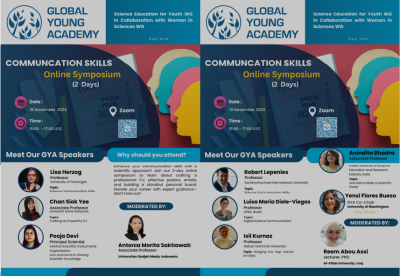
In November 2024, group co-leads Reem Abou Assi and Natisha Dukhi, together with group members and with members from several other GYA working groups, jointly published a statement on “Young researchers and scholars’ proposals for action for a sustainable present and future”. GYA Alumnus Renard Siew presented the statement during the “Climate Science: key take aways in 2024” event co-organized by the International Science Council (ISC) and the Karlsruhe Institute of Technology (KIT) on 12 November 2024.
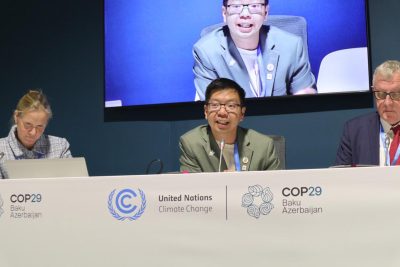
In September 2024, group co-lead Reem Abou Assi launched a collaboration with the UN SDGs group, consisting of a series of talks and training sessions aimed at raising awareness of the UN Sustainable Development Goals and putting them into practice in higher education institutions in various countries. You can find more information here.
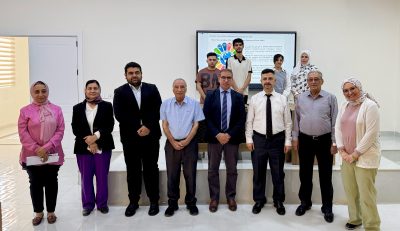
In August 2024, group member Luisa Diele-Viegas conducted a capacity-building workshop for female educators in a pilot school in Acre, Brazil, in collaboration with the Women in Science working group. This initiative provided women teachers in a vulnerable Amazonian community with advanced science education, leadership training, and climate change awareness. The workshop empowered educators with tools to develop and implement scientific projects addressing local climate challenges, including extreme temperature and precipitation events. Teachers discussed educational policies, collaborative decision-making, and strategies to enhance science education within their school community at the governance workshop. Carolina Santacruz Perez, Senior Science Officer of the Regional Focal Point for Latin America and the Caribbean at the International Science Council, contributed remotely and provided valuable insights into global science policy and governance.

In August 2024, the GYA working group on Global Health released a video on Antimicrobial Stewartship. The project was led by Karen Cloete, Pradeep Kumar and by former co-lead of the Science Education for Youth working group, Jane Yau. It aims to promote the appropriate use of antimicrobials (including antibiotics), improve patient outcomes, reduce microbial resistance, and decrease the spread of infections caused by multi-drug-resistant organisms. Learn more about the project and watch the video (in four languages) here.
At the GYA AGM in May 2024, group member Francesco Maurelli organised a workshop on “AI Horizons: Empowering Sustainable Science for a Better Tomorrow”, which explored the pivotal role of Artificial Intelligence (AI) in advancing science and driving sustainable development.
In August, group members Sri Fatmawati , Siok Yee Chan and project assistant Xin Yi Teoh led a workshop titled “DIY Cosmetics” for high school students. The workshop was part of a series of science outreach programs in collaboration with the Ministry of Science, Technology and Education of Malaysia, known as the “Borneo Science Adventure Tour Series”. For the full report and photos, click here.
In June, the group held a Capacity Building Workshop at the 2023 AGM in Kigali, Rwanda, discussing the problems related to the lack of education worldwide.
In March, group co-lead Jane Yau and group member Sam Chan were part of a group of authors who published a conference paper on “Students’ experiences of online learning during COVID-19. Improving education for a more equitable world” in Comparative & International Education Society.
For the 2023 International Day of Education on 24 January, the group compiled a collage pledging to observe the global movement of supporting quality education for all including girls, children with disabilities or from minority groups, conflict areas & environments suffering from climate impacts.
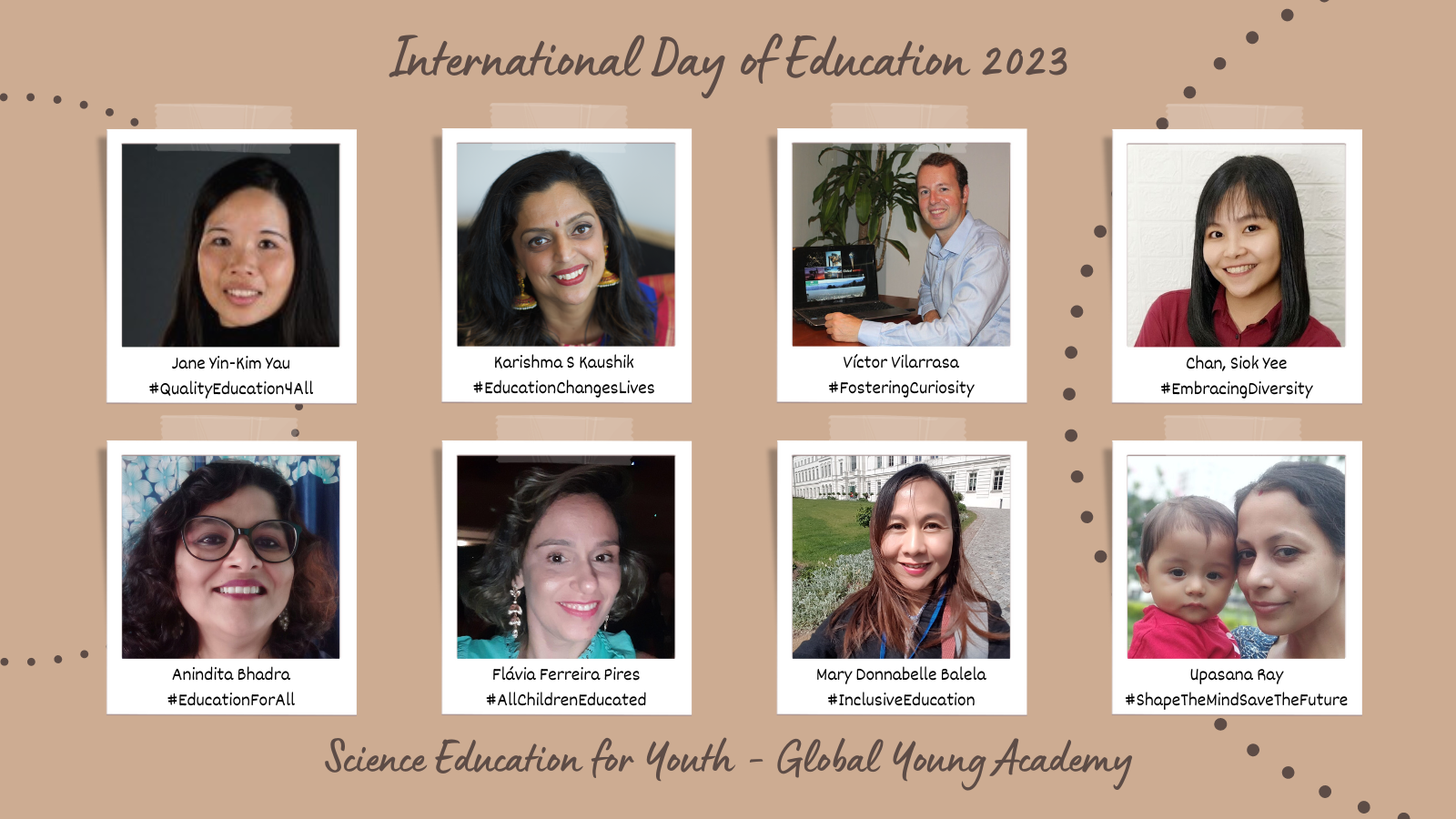
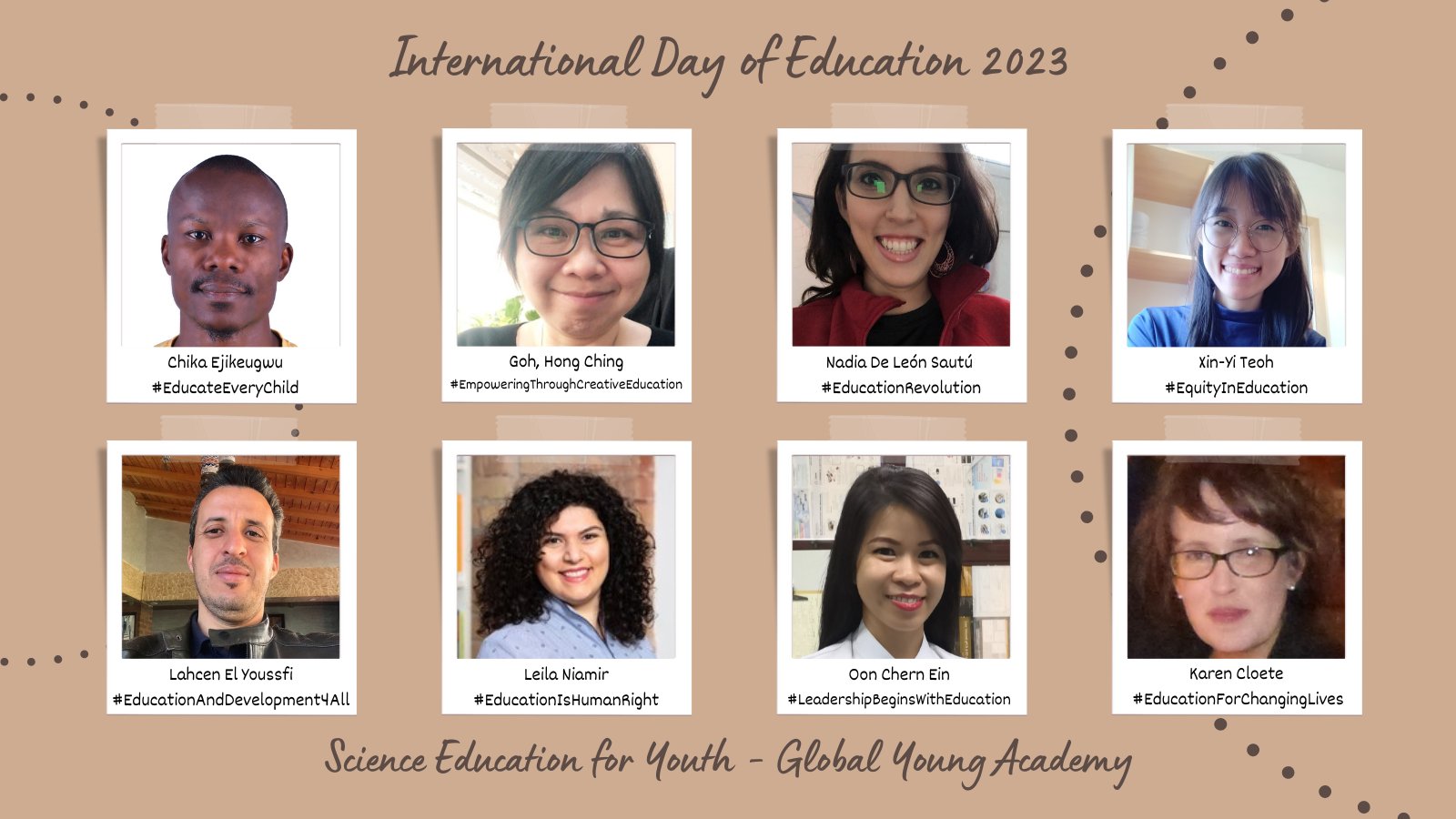
Science outreach at the GYA Annual General Meeting in Germany (April 2019).
On the occasion of the 2019 GYA Annual General Meeting in Halle, Germany, group members participated in a science education outreach event making solar cells with berry juice, co-organised with the Francke Foundations in Halle, with children aged 6 – 12.
Workshop on Water Sciences, July 2018
GYA member Lahcen El Youssfi (Morocco) organised a workshop on water sciences at the American Language Center of Tetaoun, Tetouan, Morocco in July 2018. The workshop was part of a summer camp for kids from marginalised parts of Tetouan, and it aimed to disseminate scientific information related to water, water cycle and the importance of the water economy with a focus on water print concept. The workshop included group work activities for encouraging the participants to discuss and to imagine innovative ideas for making a big impact in water economy. The groups evaluated each other after pitching their ideas at the end of the workshop and a symbolic prize was awarded to the winning group.
Science for Peace Caravan, May 2018
Working group members participated in the Science for Peace Caravan outreach mission in Siem Reap, Cambodia, in May 2018. See here for a mission report, or watch the caravan video here.
Foldscopes workshop, May 2018
Group member Rothsophal Nguon (Cambodia) collaborated with Richard Dorsett, the founder of Low Tech Science, to bring a few hundred foldscopes to Southeast Asia in 2018. In May 2018, they held their first three introductory workshops in Siem Reap, Cambodia. They collaborated with 15 schools and trained 35 teachers. Over 3,000 students benefited including public, private and NGO schools, as well as local universities.
MicroSHOT: Engaging the Filipino Youth in the Science of Microbiology, March 2018
As part of the group’s activities aimed at engaging young people in science, GYA member Thomas Edison dela Cruz (Philippines) conducted ‘MicroSHOT: A Student Hands-On Training in Microbiology’ at a high school in Tigaon, Camarines Sur, Philippines, in March 2018. The one-day event began with four science lectures on slime molds and lichens and the ecology and economic importance of these microorganisms. These lectures highlighted how scientists apply the scientific methods in their conduct of research for the protection of biodiversity and applications in society. Students were also trained to perform basic microbiological techniques such as aseptic transfer and culture of bacteria. The event also became a platform to train the next generation of young Filipino scientists and science educators. Five graduate students from Thomas’ lab acted as lecturers and workshop trainers. Through this activity, these graduate students learned to present and communicate their research outputs and to teach basic techniques in microbiology to an audience of enthusiastic high school students.
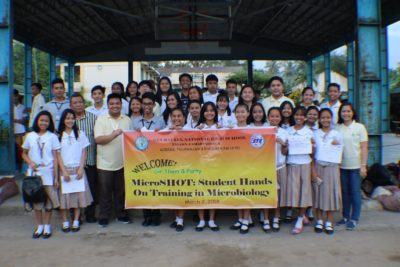
Scientific writing activities in Vietnam
GYA member Tran Quang Huy (Vietnam) engaged in a number of science education activities in September-December 2017. First, he led a workshop on ‘Writing Research Proposals and Scientific Manuscripts’ at the National Institute for Control of Vaccine and Biologicals, Hanoi, Vietnam. He followed this up with a seminar on ‘Scientific writing skills for the youth’ at the National Institute of Hygiene and Epidemiology (NIHE), Hanoi, Vietnam. In September 2017, he also talked to young lecturers at the Faculty of Basic Science of Hung Yen University of Technology and Education about scientific writing skills and manuscript publication in international journals.
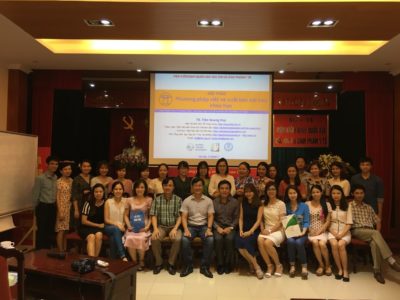
Food Security Workshop in Cambodia, July 2017
GYA member Rothsophal Nguon launched a human food security workshop with 15 university students focused on personal and food security in Siem Reap, Cambodia, in July 2017. This workshop raised awareness of non-traditional security, while also training the students on how to run a similar workshop themselves. After the workshop, the participants can use the acquired skills and knowledge to initiate their own campaign or activities to raise awareness on the same issue or any matter of interest in their own community. In this workshop students’ knowledge is fundamentally built based on the United Nations’ sustainable development goal indicators 2, 4, 5, 6 and 13.
Beyond the workshop, Rothsophal also took students to rural villages in the Phnom Kulen National Park, one of the main water sources for Siem Reap province. There they planted some trees and learned about the livelihood of the people in that community in order to understand their needs, and to identify how the youth can best be served by using knowledge gained from the workshop.
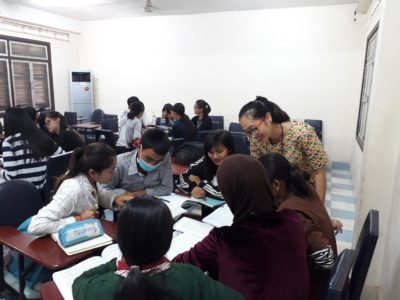
SCIENCE IN ACTION – Primary School Science Fair Day in Nakawa District, Uganda
Connie Nshemereirw: 1 April was put aside as Science Fair Day in primary schools in the Nakawa District in Kampala, Uganda. This is in line with the government policy on strengthening Science and Technology education (STI) at all education levels, for the purpose of creating the human resource necessary to achieve the aspirations of Vision 2040. The theme of the Nakawa Primary School Science Fair was Science in Action, and was aimed at using readily available materials to set up experiments and models of science principles. Below are some impressions from some of the Science Fairs held around Nakawa. Children at Kiswa Primary School demonstrating road safety as well as plant reproduction. Showing off their projects completed during technology class – Kiswa Primary school:


Rothsophal Nguon has conducted a Community Outreach Programme in Cambodia in 2016:

And Isil Kurnaz has conducted the Brain Awareness Week funded by FENS in Istanbul for the third time with a team of 8 Professors and over 12 graduate students, and has reached over 800 students:




As part of the GYA Annual General Meeting in May 2012, the group produced a video introducing the Working Group Science4Youth. The video informs about challenges regarding science education in schools in the developing world and makes suggestions on how to address them. Watch the full video here.